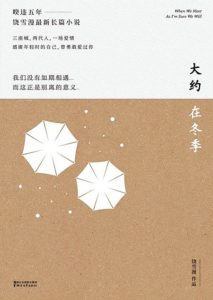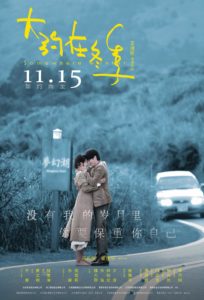Somewhere Winter
大约在冬季
China, 2019, colour, 2.35:1, 123 mins.
Director: Wang Weiming 王维明.
Rating: 8/10.
Quality, long-limbed melodrama, anchored by terrific playing from Mainland actress Ma Sichun.
Beijing, 1991, winter. Outside the Workers’ Stadium in the snow, An Ran (Ma Sichun), a Beijing Normal University student from Chengdu, Sichuan province, tries for a ticket to the China tour of popular Taiwan singer Qi Qin. At the last minute she’s offered a spare ticket by a stranger (Huo Jianhua), who says his friend hasn’t turned up. Los Angeles, 2019. An Ran tells her daughter Xiaonian (Wen Qi), who’s studying Kunqu opera, that she must fly back with her to Beijing as An Ran’s father, a former university professor, is in a coma and dying. In the hospital An Ran decides to let him go. She was once a well-known TV presenter with her own chat show, Super Talk 超级聊天, but now feels alone: her husband already passed away in 2017 and she has poor relations with Xiaonian, whom she tells to go back to Los Angeles. Three days after the death, Qi Yitian (Lin Bohong) arrives from Taiwan to pay his respects and meets Xiaonian at the family home. He’s the grandson of history professor Qi Guolin (Fu Lei), who was an old friend from schooldays of An Ran’s university professor Yu Zhenhua (Li Guangfu) and ended up moving to Taiwan in the late 1940s. Qi Yitian shows Xiaonian an album of his father’s photos, one of which is of her in 1991. Beijing, 1991. During the concert the man who gave An Ran the spare ticket takes a photo of her; afterwards she asks him to send her a copy and gives him her university dorm address. His name is Qi Xiao, from Taiwan, and is trying to make a go of it in Beijing with a wedding-photo studio. His girlfriend, Ye Yuchen (Hou Peicen), a model, has come over to join him for a while, but she’s temperamental and constantly annoys Qi Xiao. Meanwhile, An Ran waits for the copy of the photo in vain. In 1993 she finally meets Qi Xiao again, at a meal thrown by her professor Yu Zhenhua. Qi Xiao invites An Ran to visit his photo studio and the two hit it off. But when she calls his flat later, Ye Yuchen happens to answer the phone and, hearing a female voice, lies that she’s his wife. In 1994 Yu Feng (Wei Daxun), Yu Zhenhua’s son, helps An Ran to get some work in publishing so she can qualify for a residential permit in Beijing. Since being fellow students he’s always held a torch for her; but An Ran fancies Qi Xiao, with whom she gets back together after the misunderstanding about him being married is cleared up. Beijing, 2019. Qi Yitian and Xiaonian have grown close, but he has to go back to Taiwan and she to Los Angeles. Then, just before leaving, Xiaonian makes a discovery about the past of her mother, Qi Xiao and Ye Yuchen that rocks her to the core.
REVIEW
A long-limbed story of unfulfilled love that shuffles relationships back and forth across almost 30 years, Somewhere Winter 大约在冬季 is a quality melodrama that marks an impressive Mainland debut by Taibei-born director Wang Weiming 王维明 after his notable first feature (Sex) Appeal 寒蝉效应 (2014). It also confirms the burgeoning talent of  Mainland actress Ma Sichun 马思纯, in her most challenging role to date, following her breakthrough alongside actress Zhou Dongyu 周冬雨 in SoulMate 七月与安生 (2016), a moving study of female friendship and its submerged reefs. Beautifully scripted by prolific Mainland author Rao Xueman 饶雪漫 from her 2018 novel of the same name (see cover, left), and more than justifying its two-hour running time, Winter took a respectable RMB228 million on release and was among the most satisfying non-action movies of last year.
Mainland actress Ma Sichun 马思纯, in her most challenging role to date, following her breakthrough alongside actress Zhou Dongyu 周冬雨 in SoulMate 七月与安生 (2016), a moving study of female friendship and its submerged reefs. Beautifully scripted by prolific Mainland author Rao Xueman 饶雪漫 from her 2018 novel of the same name (see cover, left), and more than justifying its two-hour running time, Winter took a respectable RMB228 million on release and was among the most satisfying non-action movies of last year.
Wang, aged around 50, graduated from Taibei National University of the Arts in 1992 and worked as an assistant director and actor for the late Taiwan director Yang Dechang 杨德昌 [Edward Yang] (A Confusion Confusion 独立时代, 1994) and actor for Mainland queer activist/film-maker Cui Zi’en 崔子恩 (My Fair Son 我如花似玉的儿子, 2007), as well as directing TV drama and commercials. His feature debut, (Sex) Appeal – in its Taiwan/China version, not the misconceived “international version” – was an ambitious attempt at an adult drama in Taiwan , showing how an unprovable teacher-student “rape” case fanned out to affect the lives of various other people. Like Winter, it also had a complex time structure and drew surprisingly strong performances from its lead actresses.
Anhui-born Ma, 31, debuted fourth-billed as a child actress in logging drama Winter of Three People 三个人在冬天 (prod. 1995, rel. 2005), starring her aunt Jiang Wenli 蒋雯丽, and, following her role as the lead girl’s neighbour in Lan 我们天上见 (2009) – Jiang’s impressive directing debut – first made a major mark as the sassy high-school dropout Li Bala in The Left Ear 左耳 (2015), outperforming lead newcomer Chen Duling 陈都灵. After another hard-arsed role in action-fantasy Time Raiders 盗墓笔记 (2016), and as a trainee reporter in the fine college rom-com Nuts 奇葩朵朵 (prod. 2015, rel. 2018), she showed her acting mettle the following year in SoulMate and, as the emotionally damaged daughter, in whodunit thriller The Shadow Play 风中有朵雨做的云 (dir. Lou Ye 娄烨), shot in 2016 but  first shown only in late 2018. As well as being plagued by delayed release dates, her career has been notable for being vestigially linked with Rao’s name: The Left Ear was also adapted from one of the author’s novels and as a teenager Ma was a model for the cover art of Rao’s 2007 novel Joy & Sorrow 甜酸 (see left, Ma at bottom right).
first shown only in late 2018. As well as being plagued by delayed release dates, her career has been notable for being vestigially linked with Rao’s name: The Left Ear was also adapted from one of the author’s novels and as a teenager Ma was a model for the cover art of Rao’s 2007 novel Joy & Sorrow 甜酸 (see left, Ma at bottom right).
Ma’s slightly unconventional looks have always fitted her for more characterful rather than just flower-vase roles and, good as she was in SoulMate, she’s stretched to the limit in Winter, playing everything from a bright-eyed university student in 1991 through a TV chat-show celebrity in the mid-1990s to a hardened mother estranged from her daughter in the present day. But Ma brings it off in style, looking convincing in all time periods and exuding an inner beauty that communicates itself to the viewer. Though top-billed, she’s only one of a rich ensemble of players; but by playing her character An Ran at all stages of her adult life she’s the glue that holds the whole sprawling story together. Screen chemistry with Taiwan actor-singer Huo Jianhua 霍建华 (Hide and Seek 捉迷藏, 2016; Suddenly Seventeen 28岁未成年, 2016), as the elusive love of her life, is good but 40-year-old Huo, though much less wooden and more sympathetic here than usual, simply doesn’t have Ma’s emotional range.
Flashing forward and backward, and peppered with datelines, the story is a familiar genre in Chinese (and other Asian) cinema but a tricky one to bring off unless there’s a real sense of over-reaching architecture – or strong performances – to minimise the bittiness. Wang’s actor-centred direction has a sense of emotional flow above and beyond all the flashbacks and, though the plot depends on a couple of twists and withholding information from the audience until the later stages, that’s par for the course in the genre and well structured here. The extra scenes excerpted during the end credits show how much was lost during the final edit – and suggest that Winter could actually have carried a longer running time. (Wang’s first feature also felt too squeezed.) The versatile widescreen photography by ace Taiwan d.p. Li Pingbin 李屏宾 [Mark Lee], who also shot (Sex) Appeal, is good-looking but not soupy and a big help throughout, as is the well-spotted score by Taiwan composer Zhong Xingmin 钟兴民 (Hear Me 听说, 2009; Gf*Bf 女朋友 男朋友, 2012), full of emotional colour without being saccharine or over-blown. Veteran Hong Kong editor Kuang Zhiliang 邝志良 also turns in a smooth job, aiding the easy sense of flow.
Among the rest of the cast, Taiwan actress Wen Qi 文淇 (Angels Wear White 嘉年华, 2017; Gone with the Light 被光抓走的人, 2019) is strong as the daughter, pairing well with fellow Taiwanese Lin Bohong 林柏宏. Taiwan presenter Hou Peicen 侯佩岑 is equally okay in the bitch-on-wheels part, while Mainlanders Wei Daxun 魏大勋 (The Last Wish 小小的愿望, 2019) and actress-singer Zhang Yao 张瑶 are solid as An Ran’s male and female BFFs. The film’s Chinese title (“Around Winter”) is a well-known song by veteran Taiwan singer Qi Qin 齐秦 [Chyi Chin], whose idea to build a film around it first inspired Rao to write the novel. Qi himself bookends the film with two concerts, in 1991 and 2019, and is credited along with Rao as chief production supervisor 总策划.
CREDITS
Presented by Beijing Dino Films (CN), Zhejiang HG Entertainment (CN), Tianjin Maoyan Weiying Cultural Media (CN), Beijing Sparkle Roll Media (CN), Jiangsu The Dream House (CN), Tencent Pictures (CN). Produced by Jiangsu The Dream House (CN).
Script: Rao Xueman. Novel: Rao Xueman. Photography: Li Pingbin [Mark Lee]. Editing: Kuang Zhiliang. Music: Zhong Xingmin. Art direction: Xie Mingren, Wang Yunqi. Styling: Gao Xianling. Sound: Si Zhonglin, Li Danfeng. Visual effects: Zhang Jiahua, Zhang Wei.
Cast: Ma Sichun (An Ran), Huo Jianhua (Qi Xiao), Wei Daxun (Yu Feng), Zhang Yao (Sun Yaoyao, An Ran’s roommate), Lin Bohong (Qi Yitian), Wen Qi (Xiaonian, An Ran’s daughter), Hou Peicen (Ye Yuchen, Qi Xiao’s girlfriend), Li Guangfu (Yu Zhenhua, professor), Liu Huiyi (Yu Zhenhua’s wife), Liao Xueqiu (An Ran’s mother), Zhao Jiaqi (dormitory caretaker), Yang Xiaolan (Na’na, newspaper reporter), Hu Zixuan (Xiaojing, Qi Xiao’s assistant), Chen Hongyu (pub singer), Li Jing, Zhang Jialu (TV station bosses), Li Chao (CD shop owner), Liu Yuan (Yu Xiaonian’s Kunju Opera teacher), Sun Yuandong (Workers’ Stadium security man), Tian Lu (Workers’ Stadium ticket tout), Luo Hujia (An Ran’s uncle), Wang Jie (An Ran’s aunt), Kang Xuan (Xiaojiao), Xiao Jiayi, Chen Zheling, Zhu Chaoyi (An Ran’s fellow students), Xiao Hong, Li Shaobo (newspaper bosses), Fu Lei (Qi Guolin, Qi Xiao’s father), Wang Weiliu (Taiwan gangster), Bai Haitao (passenger on plane), Da Dong (Wu), Jian Yizhe (Taibei noodle-shop owner), Qi Qin [Chyi Chin] (himself).
Release: China, 15 Nov 2019.
